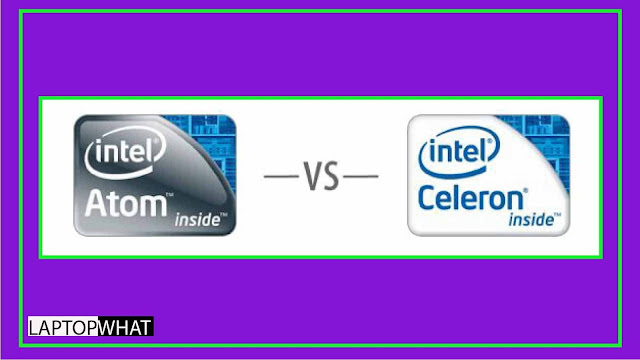Intel Atom Quad Core vs Celeron Dual Core both are low-end processors for low-end mobile devices and laptops. However, like a quad-core processor, Atom has the advantage over the Younger in performance. That doesn't mean the Celeron processor is a failure. In fact, they are better valued for money than Atoms. They produce a decent and great performance but don't cost a fortune either.
If you want to know more about Atom Quad Core Vs Celeron Dual Core, let's dig into these claims.
Intel Atom processors
Honestly, these processors are a thing of the past. In fact, after 2016, you'll rarely see any device carrying it. But if you can find it on any device and want to buy it, by all means. The processor family offers decent performance.
The devices you'll be buying will be discontinued cell phones and laptops. As they are outdated, you may find it difficult to work on some applications and software because they are no longer supported.
Unlike the Core series, they don't have an "i" in their name or names. Instead, they have an "x". Processors worth considering are x3, x5, and x7.
You should also know that other prefixes before the serial number indicate which devices the processor is used for. For example, the E in E43423 stands for embedded system. If you see a C it means mobile, but Z is fully mobile.
The most powerful processors in the Atom series
All series, including X3, X5, and X7 are further equipped with their own processor series.
The X3 features the C3130 with 2 cores and 1 GHz clock speed, the C3200RK with 4 cores and 1.10 GHz speed, and the C3230RK with 4 cores and 1.10 GHz effective speed, and the C3445 with 4 cores and 1.20 GHz speed.
All of the X3 lineups aren't even worth considering due to the low clock speeds. Modern phones don't even have these speeds. They are above 2 GHz. This is because of the need for better, faster, not to mention power-efficient processors to meet application demands (or should I say growing demands).
Therefore, you may wish to ignore this list.
Next is the X5 series, with the Z8300 up to 1.82 GHz, the Z8339 up to 1.92 GHz, the Z8500 up to 2.24 GHz, and the Z8550 up to 2.4 GHz. Now here, the Z8500 and Z8550 are two processors you might want to bet on. They have 4 threads, just like modern low-level processors.
Speaking of the X7, there are only two series - the Z8700 and Z8750, clocked at 2.4 GHz and 2.56 GHz respectively, with 4 cores and 4 threads.
All X5 and X7 series has only 2MB of cache, X3 even as low as 1MB. So, you can guess why I want you to give up the X3 entirely - that's one of the reasons.
If you really must choose an Atom processor, choose between the X5-Z8500 and the X7-Z8750. These two processors are the most powerful in the atom series.
Intel Celeron processors
Intel Celeron and Pentium are newer than Atom and they are important even today. In fact, the Celeron has the edge when it comes to value for money. how? They are cheaper, but they do have performance. Some processors in this series are closer to the performance of the Pentium series.
Beyond that, one of the main differences between Atom and Celeron processors is that the latter is purely designed for small or low-end laptops like Chromebooks.
For notebooks
One of the most popular processors that manufacturers use for their laptops today is the Intel Celeron N4000. The N4100 is a powerful quad-core processor. But as I said, the most popular is the N4000. For high-end desktops, the Intel Celeron J4005 with a maximum speed of 2.7 GHz and the G4900 with an effective speed of 3.1 GHz has also been released.
Cost-effective option
According to some benchmarks, the N4000 even features an Intel Core i7 9th Gen when it comes to value for money. Its CPU is marked 1400, and when you divide that by the $107 total, you get cheaper cores at every price point.
This value is slightly lower than the 7th Gen Core i7.
That said, if you buy a laptop with this processor, you're likely to get more power for the price you pay. However, I know it's not that much. You can't compare it to something like the Apple M1 8, for example.
Are Atom processors better than Celeron?
As the name suggests, Intel Atoms are more power-efficient compared to the Celeron series because they have a very low maximum boost frequency so the battery is less stressed, to begin with.
Is quad core processor better than Celeron?
Celerons are inferior processors that were originally integrated into low-end laptops and computers to meet the needs of budget users. Quad cores, on the other hand, are more powerful and offer more maximum boost frequencies for users performing CPU-intensive tasks.
Is the Intel Atom processor is good?
Yes, as long as you don't mind being slower and on a tighter budget, the Intel Atom does light tasks well. They're also conservatively powered, so expect greater battery runtime, which is always a plus!
Final words
If I didn't have the budget for a powerful upper-tier laptop, I would go for the Intel Celeron N4000 at all costs. This is because it is a newer technology compared to the Atom processor. Laptops and notebooks with this chipset are great for everyday tasks like browsing on Chrome, doing small editing, and streaming content.
Yes, it's a bit pricey, but seriously, why would you pay $37 or $27 for an outdated processor when you're buying a Celeron for $107. We hope you are now well informed about the Atom Quad Core Vs Celeron Dual Core comparison.

